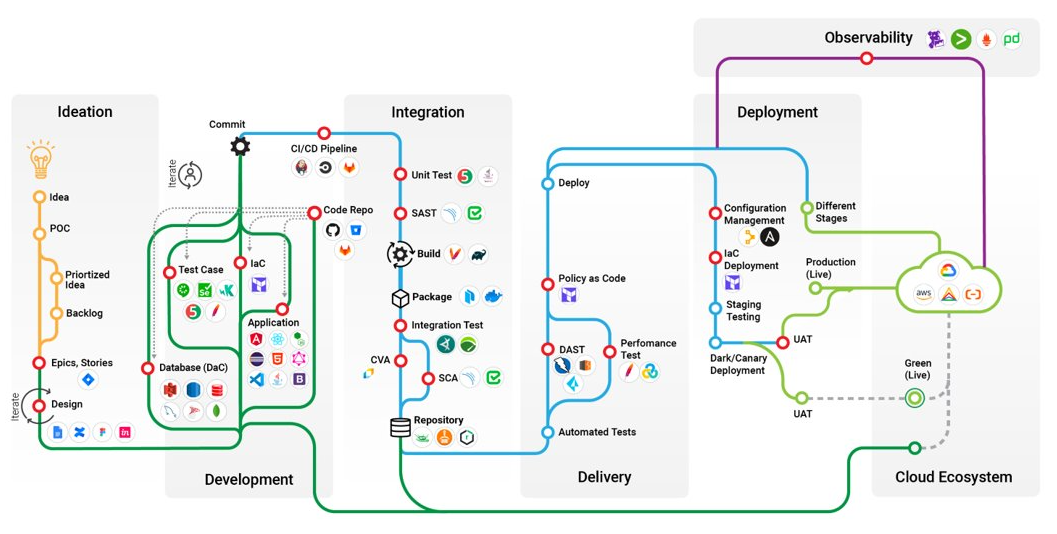Need for Self-Service Development Platform
In today's digital landscape, innovation is the driving force behind business success. Enterprises are continuously enhancing their product and technology capabilities to deliver digital products faster and more efficiently, to gain competitive advantage. However, this has also brought along new challenges for developers, data engineers, architects, and product managers, resulting in loss of productivity and a substandard developer experience. Some of the current industry challenges include:
-
Technology Explosion
A plethora of new technologies and frameworks are emerging, adding to the complexity of decision-making processes. Teams working with these technologies are expected to stay updated, which adds to their cognitive load. This can lead to deviations from established standards, confusion, and inefficiencies in product development.
-
Cross-Functional Collaboration
Digital silos are a growing concern, leading to ineffective collaboration among dispersed teams of developers, data engineers, and architects. This lack of effective communication can result in knowledge gaps and delays in planned releases.
-
Rapid Iterations
The ever-increasing demand for fast cycle experimentation, rapid iterations and shorter time-to-market can strain traditional development processes. Streamlined workflows and automation to meet accelerated timelines are a must.
-
Leveraging Data
Data is at the core of digital products. But with the rapid adoption of digital transformation has led to a challenging situation of effectively managing, processing, and analyzing large datasets. The volume, variety, and velocity of data present challenges related to scalability, performance, and data integrity.
-
Skill Diversity and Deficit
The diverse skill sets of developers, data engineers, and architects can lead to communication gaps and misunderstandings. These disparities can impact the overall quality and coherence of the final product.
-
Capacity and Resource Management
Efficiently allocating resources, including time, manpower, and infrastructure, to various stages of product development is an ongoing challenge. This allocation can significantly impact project timelines and overall success.
-
Change Management
Adapting to evolving customer requirements and market trends can disrupt ongoing development cycles. This demands flexible processes and the ability to pivot without causing major setbacks.
Because of these challenges, developers often rely heavily on the technology operations team for support and assistance. This increases the friction in the system and hampers the overall productivity. Addressing these challenges is essential for enterprises aiming to stay competitive in the digital landscape. To mitigate these obstacles and to enable organizations to achieve their digital goals efficiently and effectively, the need is to enable self-service capabilities for developers. The Calibo Accelerate platform helps you empower your developers, enhance their end-to-end application development experience, improves cross-functional team collaboration, and streamlines your development life cycle across all phases right from ideation to deployment.

What is a Self-Service Development Platform?
A self-service development platform is a software environment that empowers developers and other stakeholders within an organization to conceptualize, design, develop, deploy, and manage software applications with minimal reliance on centralized IT or operations teams. Such a platform is designed to enable rapid digital innovation through automation of workflows, standardization of tools and technologies, and implementation of governance, security and compliance controls across the entire development life cycle. Here are a few compelling reasons why enterprises need a self-service development platform:
-
Improved Developer Experience
Attracting and retaining top software engineering talent is crucial for an organization. A self-service platform simplifies and automates many development tasks, making the development process more enjoyable and efficient. This, enhanced developer experience makes it easier to attract and retain skilled developers.
-
Governance and Compliance
A self-service development platform helps you enforce governance, security, and compliance controls, ensuring that application development adheres to organizational policies and regulatory requirements. This reduces the risk of security breaches, data leaks, and compliance violations.
-
Collaboration Across Teams
Dispersed teams including developers, data engineers, architects, and business stakeholders need a self-service platform that would facilitate collaboration and communication among these teams, breaking down business silos and improving cross-functional coordination.
-
Agility and Time-to-Market
Market dynamics demand faster iterations and shorter time-to-market for digital products. A self-service platform streamlines development workflows, automates processes, and provides tools for rapid development and deployment, enabling organizations to meet accelerated timelines.
-
Data Management
Data is a critical component of digital products. Efficiently managing, processing, and analyzing large datasets is essential. Self-service platforms often include data pipeline capabilities, allowing organizations to harness data for insights and improved customer experiences.
-
Resource Optimization and Release Management
Resource allocation across various stages of product development is a constant challenge. Resource management features of a self-service platform help you optimize resource allocation, improving project timelines and success rates. Release management features of the platform help you create product roadmaps, streamline the release process for products and enhancements, and manage interdependencies of releases.
-
Streamlined DevOps
Integrated DevOps practices in a self-service platform simplify the development process. They automate tasks like code deployment, testing, and infrastructure provisioning, resulting in faster, more reliable software delivery.
In short, a self-service development platform is essential to stay competitive and innovate in today's fast-paced digital landscape. It offers a range of benefits, from accelerating development to improving collaboration and ensuring compliance, making it a strategic investment for organizations across industries.
| What's next? What is Calibo Accelerate? |